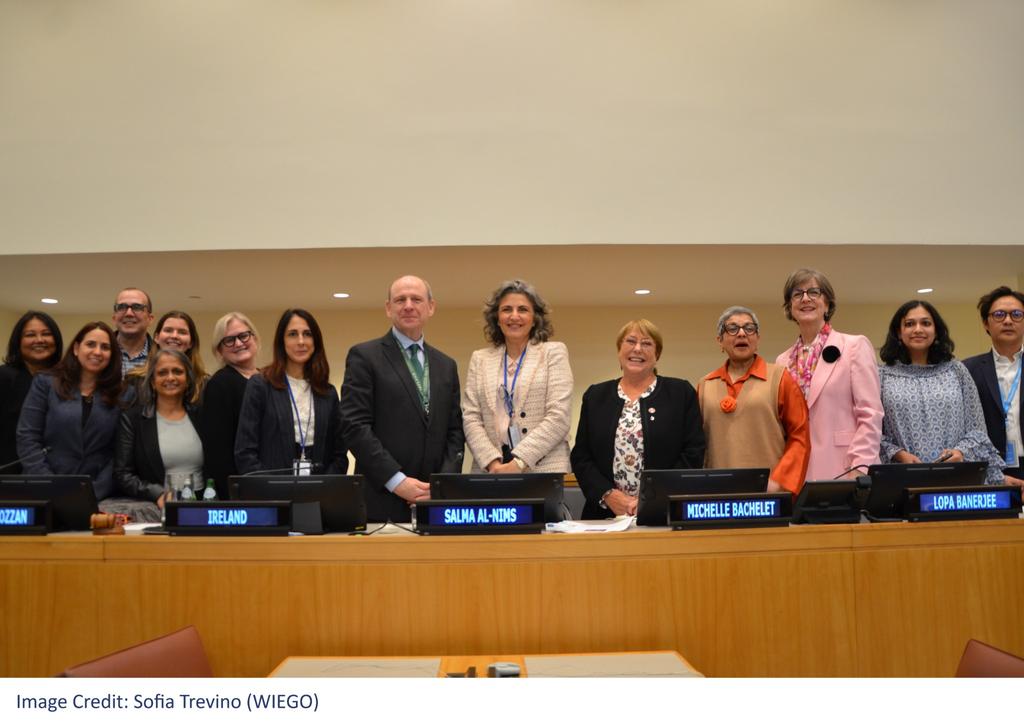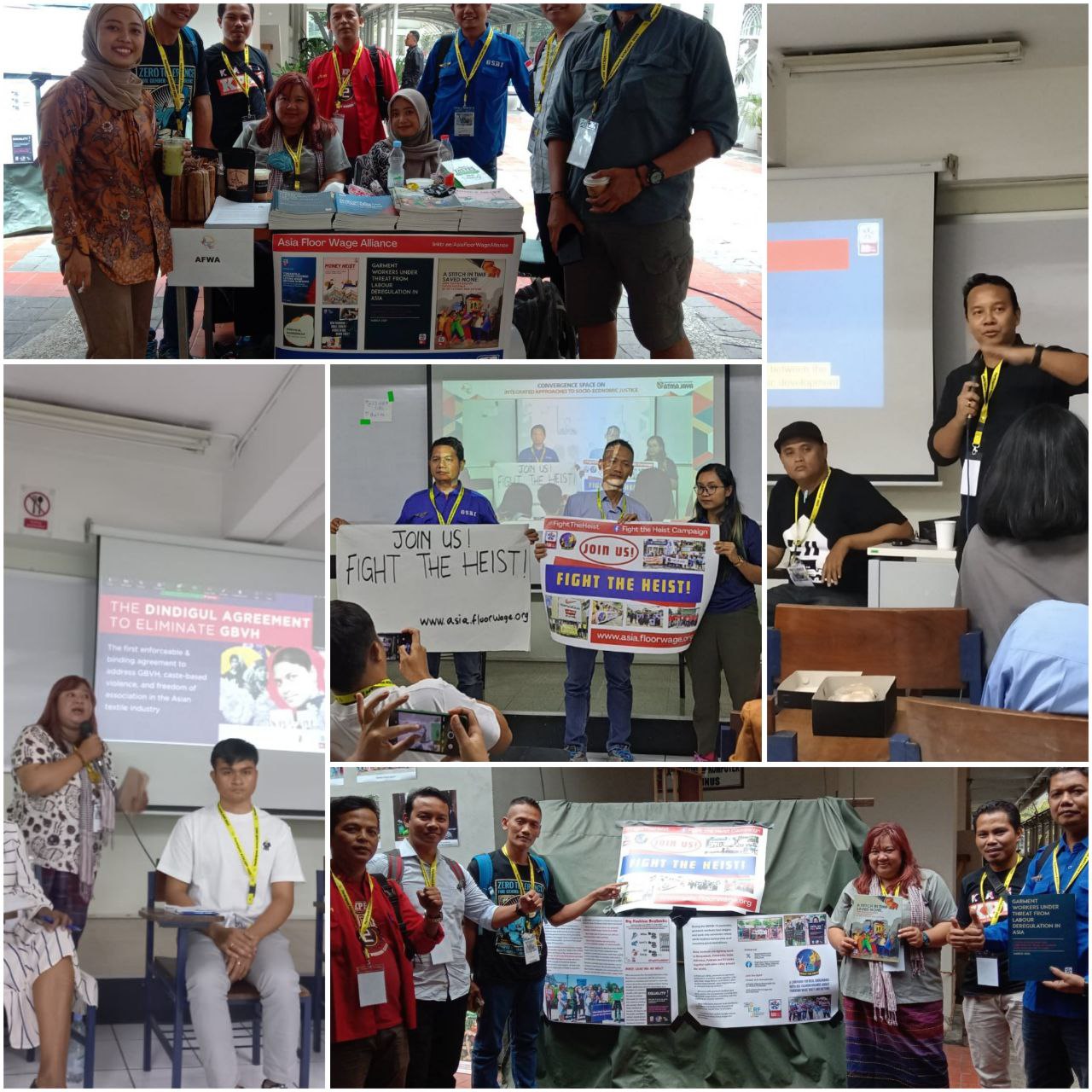Accelerating Gender Equality: Beijing+30 and ILO Convention 190

Accelerating Gender Equality: Beijing+30 and ILO Convention 190
AFWA co-hosts panel ‘Accelerating Gender Equality: Beijing+30 and ILO Convention 190’ at the United Nations
On March 13th, Asia Floor Wage Alliance co-hosted a successful High-Level Convening at the sixty-ninth session of the Commission on the Status of Women (CSW69) at the United Nations, alongside the Permanent Mission of Ireland to the UN, the Permanent Mission of Chile to the UN, UN Women, the International Labour Organization (ILO), Global Labor Justice (GLJ), Feminist Alliance for Rights (FAR), and the Inter-Parliamentary Union (IPU).
Titled “Accelerating Gender Equality: Beijing+30 and ILO Convention 190,” the panel examined 30 years of progress since the Beijing Declaration & Platform for Action and the urgent need to implement ILO Convention 190 (C190) to eliminate gender-based violence and harassment in the workplace.
The discussion featured a distinguished panel, comprising:
- Lopa Banerjee, Director, Civil Society Division, UN Women
- Paddy Torsney, Permanent Observer to the UN, Inter-Parliamentary Union (IPU); Former Parliamentarian, Government of Canada
- Thivya Rakini, State President, Tamil Nadu Textile & Common Labour Union (TTCU)
- Emanuela Pozzan, Senior Specialist on Gender Equality & Non-Discrimination, GEDI Branch, International Labour Organization (ILO)
- Sarita Gupta, Vice President, US Programs, Ford Foundation
- Michelle Bachelet, Former President of Chile
Key Takeaways: The Link Between Gender Equality & Labor Rights
A core theme of the event was the link between gender equality and women’s labor, which remains undervalued despite its fundamental role in upholding economies. While there have been significant advances in legislation prohibiting gender-based discrimination in employment in some countries, the persistent lack of enforcement and implementation mechanisms continues to leave millions of workers, particularly women in informal and high-risk sectors, vulnerable to exploitation and violence.
ILO C190 has been the fastest-ratified convention in the organization’s history, yet its adoption remains uneven, and ratification alone does not guarantee protection. The event underscored the need for stronger national frameworks, enforcement mechanisms, and corporate accountability measures to ensure that workplace protections against violence and harassment are not just commitments on paper but realities in every sector.
Lopa Banerjee emphasized the importance of centering women workers, trade unions, and feminist movements in decision-making processes because, she stated, “their voices are the ones that will drive the solutions, and we must hold global supply chains accountable for upholding the rights and dignity of women in the workforce.
Binding Agreements as a Path Forward
Sarita Gupta pointed to the Dindigul Agreement and the Central Java Agreement on Gender Justice as examples of how ILO C190 principles can be translated into binding agreements where ratification and enforcement lag. These agreements—negotiated between brands, suppliers, and unions—offer enforceable protections against gender-based violence and harassment in supply chains, ensuring corporate accountability even in contexts where state enforcement is weak.
“And where ratification lags or implementation falters, we must translate its principles into binding agreements and collective bargaining,” Gupta stated, calling the Central Java Agreement—Asia’s second supply chain agreement addressing gender-based violence and harassment—a major victory for gender justice. She credited Asia Floor Wage Alliance, Global Labor Justice, and worker-led unions for leading these efforts, reinforcing that “the solution lies not in individual actions, but in collective action and the empowerment of all workers, particularly women unions.”
Next Steps: Continuing the Momentum Beyond Beijing+30
With Beijing+30 approaching in 2025, governments and multilateral institutions have a pivotal opportunity to reinvest in gender equality. Achieving meaningful progress requires not only legal commitments but a transformation in economic and labor structures that have historically undervalued and excluded women.
As discussions on gender equality and labor rights continue, the Policy Brief co-authored by AFWA, GLJ and FAR serves as a roadmap for integrating ILO C190 into global commitments.
 Watch the full panel discussion here.
Watch the full panel discussion here.
 Read the policy brief, Women on the Rise: Gendering the World of Work, for key recommendations ahead of Beijing+30
Read the policy brief, Women on the Rise: Gendering the World of Work, for key recommendations ahead of Beijing+30

